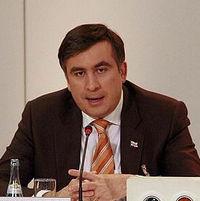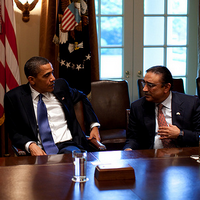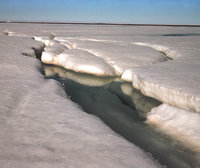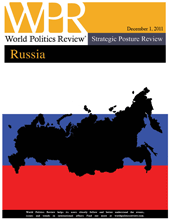The U.S. announced last month that it will no longer share information with Russia on European-based conventional weapons and troops as required by the Conventional Forces in Europe treaty. In an email interview, Jeffrey D. McCausland, a distinguished visiting professor of research at the Strategic Studies Institute of the U.S. Army War College, discussed the Conventional Forces in Europe treaty. WPR: What is the intent and purpose of the Conventional Forces in Europe treaty, and what is the nature of the dispute between Russia and NATO over the treaty? Jeffrey D. McCausland: The Treaty on Conventional Armed forces in Europe […]
Russia Archive
Free Newsletter

Another round of protests is scheduled for Russia on Saturday, raising the question of whether a “color revolution,” this one characterized by the demonstrators’ white ribbons, capable of toppling the government is in the cards. Media attention invariably focuses on mass demonstrations, banner-waving crowds and Twitter-savvy organizers, yet what happens behind the scenes is usually much more important to the outcome of such movements. Protests are not enough, and for all the color revolutions that succeeded over the past decade — in Serbia, Georgia and Ukraine — there were also some glaring failures, as in Azerbaijan and Belarus. While Russian […]
Russia presented a draft resolution to the United Nations Security Council on Thursday that condemned the violence in Syria after nine months of protests and 5,000 deaths in that country. The proposal, which demands that “all parties in Syria immediately stop any violence irrespective of where it comes from,” followed months of deadlock over whether and how the Security Council should respond to the ongoing crisis. But while the draft resolution may represent a step closer to compromise, the debate over what comes next will continue, says Richard Gowan, an associate director at New York University’s Center on International Cooperation. […]
Russian President Dmitry Medvedev traveled to Prague earlier this month to sign a deal with Czech President Vaclav Klaus establishing a joint venture on the exchange of civilian nuclear technology. In an email interview, Petr Kratochvíl, deputy director of the Institute of International Relations in Prague, discussed Russia-Czech Republic relations. WPR: What is the nature of Russia-Czech Republic relations since the end of the Cold War? Petr Kratochvíl: Roughly speaking, we can distinguish three fundamental phases. The first covers the period from the Velvet Revolution in 1989 to around 1994 and included the dissolution of both the Warsaw Treaty and […]

With Russia embroiled in mass demonstrations following surprisingly tough and contested Duma elections, the breakaway republic of South Ossetia gripped by ongoing political confusion following its own controversial presidential poll, and separatist Abkhazia coming off recent fiercely contested elections, it may be time to re-evaluate more than a few political tropes in Eurasia. The developments are all the more noteworthy in that they come as Georgia, long portrayed by Western supporters as the region’s consummate reformer, faces an unexpected political showdown that is casting the ostensibly democratic republic’s autocratic contours into sharp relief. In a stunning rebuke to Russian Prime […]
South Ossetia was the scene of protests recently after the breakaway province’s high court invalidated the results of a presidential election in which the Russian-backed candidate, Anatoly Bibilov, was defeated. In an email interview, Lincoln Mitchell, an expert on post-Soviet democracy at Colombia University, discussed South Ossetia’s disputed elections. WPR: What is the immediate background to the post-election crisis in South Ossetia? Lincoln Mitchell: South Ossetia is a small polity viewed as independent by Russia, seen as part of Georgia by most of the world, including Europe and the U.S., and in reality almost entirely controlled by Russia and dependent […]

The Obama administration entered office three years ago with high hopes that it could repair America’s relationships with other key powers in the world. While some successes were achieved in 2009 and 2010, Washington closes out 2011 facing the sobering reality of simultaneously deteriorating relationships with China, Pakistan, Saudi Arabia and Russia. At the same time, Washington can expect only limited support from its major Western allies in managing a host of global hotspots, as the ongoing eurozone crisis has, in a matter of months, turned European attention away from a more activist and interventionist approach to the world toward […]

The most striking image from last weekend’s demonstrations in Moscow against the regime of former president and current Prime Minister Vladimir Putin is that of protesters holding up iPads and iPhones over their heads, broadcasting the momentous events live over the Internet. The sight of young Russians, bundled up against the Moscow cold, speaking out for democracy via social media brings to mind the wave of political protests that have defined 2011 — from the Arab uprisings in the Middle East, to the Occupy movement in developed economies, and now in Russia. And it raises the question of just how […]

Last week’s Duma elections have identified several weaknesses in Russia’s political system that cannot easily be solved. The current political order will probably survive the protests over the blatant electoral fraud, and Prime Minister Vladimir Putin is likely to return to the presidency next year. But the Putin system that has defined Russian politics for the past decade is unlikely to last beyond the next decade, since its vulnerabilities cannot be addressed by the modest reforms that the leading members of the regime are willing to tolerate. To truly modernize, Russia must overcome Putinism, develop stronger political parties, achieve greater […]

The recent elections in Egypt and Russia have important lessons for both Washington and Beijing about the contour of politics in the 21st century — and the limits of both authoritarianism and Western-style liberalism. For the past 12 years, as part of its campaign to modernize Russia, the Kremlin has encouraged the spread of new communications technology. However, over the course of his time first as president and then as prime minister, Vladimir Putin’s concern with mass communications focused primarily on shaping television coverage. Meanwhile, the growth in Russians’ mobile phone usage, in particular, has been quite dramatic. If less […]

Recent moves by Russia, Norway and even China have put a spotlight on the High North, where warming temperatures have led to greater seasonal ice melt and access. With increased future activity in the Arctic inevitable, the United States must begin to address some of the potential security challenges that could result. As part of this effort, the European Command (EUCOM) — the U.S. military command responsible for the Arctic — must leverage the progress made by the Arctic Council in nonsecurity matters to facilitate expanded security cooperation efforts in the region. The Arctic Council has successfully raised awareness of […]

There is no question that Russian Prime Minister Vladimir Putin will easily return to the Kremlin as president next year and that he will be fully in charge of Russia when he does. But the steady erosion of his regime’s grip over the Russian public was on full display Sunday, when Russian voters elected a new Duma. In the previous legislative elections in 2007, Putin’s United Russia party polled almost two-thirds of the vote and gained enough seats to change the constitution as well. This time around, even with the help of widespread electoral fraud, the party failed to reach […]

Editor’s note: This is an updated version of Richard Weitz’s “Strategic Posture Review: Russia,” published in February 2009. In light of the imminent return of Prime Minister Vladimir Putin to the Russian presidency, it is worth revisiting the mixed legacy of his previous eight years in that office and highlighting the significant changes in the regional and global environment that have impacted Russia’s foreign and defense policies in the four years since he left it. Upon assuming office on May 7, 2000, Putin began a major campaign to restore the authority of the Russian presidency, which had waned under the […]
